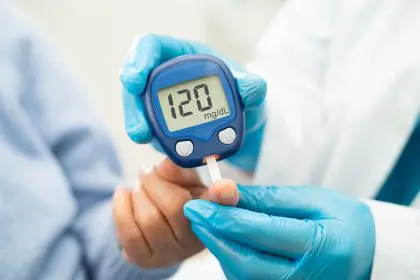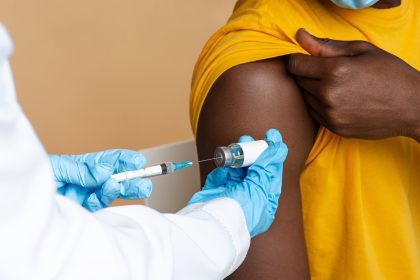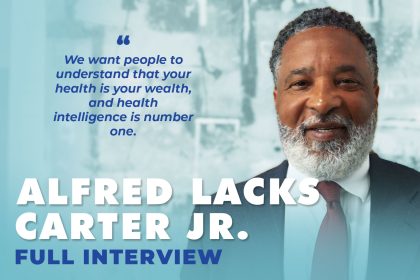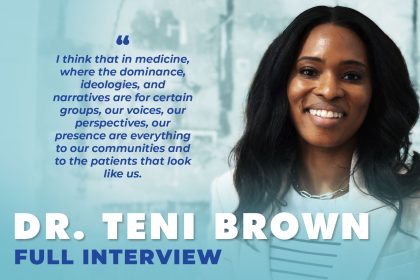Dr. Frita McRae Fisher is the founder and president of her own nephrology practice (Midtown Atlanta Nephrology, P.C.) and the medical director of a non-profit dialysis unit (DCI). Dr. Frita loves taking care of patients and giving medical advice.
She now spreads her medical knowledge beyond her office as a medical expert commentator. Her YouTube channel (Dr. Frita) has almost 700,000 subscribers. She has appeared as a medical expert on numerous media outlets: “HLN Weekend Express,” “Fox News Live,” “Roland Martin Unfiltered,” “11 Alive News NBC”, the Emmy Award-winning “Paternity Court,” “BNC News,” “PIX11 New York”, “CBS46”, “Twin States News,” “Personal Injury Court,” V-103 Radio, “Good Day Atlanta,” Revolt T.V., and The Grio.
And now, she takes time out of her schedule to talk with rolling out’s own Munson Steed.
Munson Steed: What should be our first priority, given that we now know the history of our health from our parents and how our genes play a role in our health as we progress from childhood to adulthood?
Dr. Frita: Our role and our goal should be to understand our history and genetics because many illnesses plague the Black community specifically, largely environmental, which we’ll get into that. But for some things, we are genetically predisposed. So, it’s important for us not to keep secrets in the family because our secrets make us sick. If you are diagnosed with prostate cancer, instead of being so secretive because you don’t want to be looked at as weak, let the young men in your family know. Let the ladies know so they can share it with the men and they know to get screened early. Same thing with breast cancer, colon cancer, all of it. We need to share with our families what our histories are.
Then, the other important thing is to understand that prevention does work instead of just kind of shrugging our shoulders and saying, “High blood pressure just runs in my family. You know heart disease runs in my family.” We need to figure out what we can do to prevent these illnesses instead of just sitting here and being victims of the illnesses. We can be proactive for our health.
Munson Steed: The word we have this year for sisters with superpowers like yourself is “agency.” Why does agency play such a role in our lives regarding having agency over our health?
Dr. Frita: Because it puts us in power. You know, we are in a position, especially as a Black community — where we pause, and you look at the statistics, things can actually get quite depressing. We look at the level of wealth for Black people in this country compared to others — not great. When you look at the cancer, as far as who dies the most from different cancers, who has the most obesity. Even when you look at schools, as far as who has access to the greatest education, it can make you feel like you’re a bit powerless sometimes, and even in the political arena, you can feel a bit powerless. But when you take agency over yourself, when you take control, and you actually are proactive and take action, then it can help to kind of boost your esteem, boost your energy and make you more motivated to help yourself and to help others.
Munson Steed: You’re sitting at home and watching this video. You want to take agency, having a health evaluation every year — over 50, maybe twice a year. How does that play a role when a physician knows that a patient’s going to come in on a regular basis?
Dr. Frita: The squeaky wheel gets the oil, and maybe it shouldn’t be that way, but it is. When you go in to see your doctor, you have your list of questions and your list of concerns. You’ve done your research. Now, understand if you know that you’re not a physician or healthcare provider, the research that you do on the Internet does not replace your doctor’s knowledge. But when a physician sees that you’ve taken an interest, then that physician will take an interest in you, and so the doctor will look, see your name, and they’ll be like, “Oh, boy. Here comes Miss Rosa, and she’s going to have all these questions. Let me just sit down, not try to talk over her head and explain, because she’s gonna ask me until I answer it.” And so when you let a physician know that you’re interested in your health, then the squeaky [wheel] gets the oil, and you will get better care.
Munson Steed: You wrote a book for us to really understand who we are and address our pressure… Give us a title, and then why you thought it was important to write it down and to put it in a book.
Dr. Frita: The book is Under Pressure: A Guide to Controlling Blood Pressure, and it’s available on Amazon. And I wrote it because a lot of patients will come into my office and they’ll have blood pressure sky high, you know, 200, over 110, and the first thing they’ll say is, “I don’t want to take any medicine. I want to be holistic,” which I understand. But what happens is that when they go to a typical physician — someone who’s only trained in Western medicine, someone who does not know much about food as medicine, herbs, and things of that nature, that physician will shut them down. And so, what often happens is that, even when patients want to take control of their health and do things that are natural, they’ll start to feel shamed by physicians. And so, what happens? They don’t go to physicians.
So, in this book, “Under Pressure: A Guide to Controlling High Blood Pressure,” I talk about medicine in the traditional Western way I was trained. And, yes, there are definitely times that traditional medicines are appropriate. I use medicines. If you walk into my office with sky-high blood pressure, I’m not giving you garlic and herbs that day. I’m giving you medicines to keep you from having a stroke or a heart attack. But I also am going to implement the different foods and the lifestyle that will help with the blood pressure. So, in this book, I talk about integrative medicine; I talk about how cruciferous vegetables like broccoli, kale, cabbage, and Brussels sprouts can have vital nutrients that can help lower blood pressure. I talk about fruits like raspberries, blueberries, and blackberries; they have antioxidants that fight inflammation, free radicals, and cancer-causing agents and help reduce blood pressure. I talk about beets; beets have nitrates, which your body converts to nitric oxide, which helps lower blood pressure. I talk about meditation and things of that nature. And I also talk about the role that having a low income will play in your health.
We all talk about, “Oh, go eat fresh foods, organic foods.” But if you don’t have Whole Foods or Sprouts around the corner and you don’t have a car, you can’t get those foods, or even if you can’t get to one of these expensive restaurants if you don’t have the money. You can’t eat those foods if you’re on a fixed income. So, in this book, I talk about how you can still be healthy wherever you are and your economic status. And so the book gives a comprehensive way of integrative health, natural medicine, and knowing when it’s appropriate to take traditional medicines. And it’s really all in talking to a physician you trust.
Munson Steed: Is it okay to advocate for yourself when you visit the doctor? And tell us what advocating is first, so you don’t go in there sounding crazy, and then the doctor just calls security.
Dr. Frita: Not only is it okay to advocate for yourself — it’s absolutely necessary. I’m so excited that now, some of the things that have been going on and some of the disparities that we’ve known about for years are coming to the forefront. For example, Black maternal mortality and how Black women are three times as likely to die around childbirth. And that’s not a socioeconomic thing. Even highly educated women, women with high incomes — same thing. There’s a certain implicit bias that puts us at risk.
When you advocate for yourself and go in, you have the knowledge to speak up for yourself and are not afraid to speak up to authority. That’s what it means. Instead of worrying about being polite or taking this approach where the doctor is like, you know, the paternal or maternal figure, you just don’t question them. No, you do question. It’s okay to question authority, and there’s a way to do it in a respectful manner, but, quite frankly, a question in and of itself is not disrespectful, so ask questions if you don’t understand. If you’re in pain. They give you medicine, don’t think. “Oh, well. They gave me medicine. I don’t want them to think I’m pain-seeking.” No, you say, “Guess what? I still hurt,” and so they’ll either have to give you more pain medicine or explain the mechanism of the pain medicine. But you speak up about it.
If you don’t understand why you’re being discharged from a hospital when you still really don’t feel great, you speak up. And there are levels. Just because the nurse, tech, or even the physician says, “Nope, you gotta go,” they’re levels at different hospitals. There are always patient advocates or places where you can complain even before you leave the hospital because the truth is, it’s a hospital for healthcare. Still, it’s also a business, so don’t just take no for an answer. No, you don’t have to scream and holler and show out and have security called on you. But you can say, “You know what? I’m not comfortable with this doctor respectfully. “I’d like to speak to the patient advocate of this hospital.” So that’s what it means to advocate for yourself. You understand that you have the right to have good health care, and you can, and you should question authority. Speak up for yourself and for your loved ones.
Yeah, that was one of the hard things with the pandemic when there was a lockdown and loved ones weren’t allowed to be in the hospital rooms. That’s where we lost that advocacy. But now, you know, everyone really needs to just speak up and again be that squeaky wheel and get the oil.
Munson Steed: You get a notice that you’re prediabetic. What should some of the first steps be for a person who has been given an indicator that, hey, you’re prediabetic? What’s on the menu at that moment?
Dr. Frita: The first thing you should do is be thankful that you got the warning of being prediabetic because a lot of people don’t get that warning. They show up, and they already have kidney failure and heart disease. They’re already in need of an amputation. So that’s the point of going to the doctor, even when you feel okay, to get screened to find out if you’re prediabetic. The way you find out is from that hemoglobin A1C test, and if they find that it’s greater than 5.7 but less than 6.4, then you’re prediabetic. So, you still have time to do better. So, what do you do?
No. 1, you educate yourself. I’m very excited that I have a YouTube channel… We’re up to over half a million subscribers. We have over 37 million views, and I give a lot of information on all kinds of health issues, but diabetes in particular. I have [explained diabetes in] a video. What does sugar do to your body? So, you want to go and educate yourself to learn what diabetes is and how serious it is. I’ll tell you how serious it is: It is the number one cause of kidney failure in this country.
So, when I see patients on the dialysis machines and my dialysis units, most of them have diabetes, which is largely a preventable disease. How do you prevent it? And how do you manage it? Well, diet is going to play a huge part. No. 1, you want to stop putting added sugar into your body or limit the added sugar. So, things like processed foods, juices, sugary drinks, candies, cakes, all of those things with added sugar. You really want to push them out of your diet or certainly limit them, and that can help to prevent you from progressing to actual diabetes. You want to have a healthy weight.
So, the BMI, which is not necessarily the best measurement. But it’s the measurement that most doctors will use. If you have a BMI that is 25 or higher, then you’re considered to be overweight, and if it’s over 30, you’re considered to be obese, and that puts you at a high risk. If you’re living with obesity or overweight. So, what you want to do. No. 1, talk to your doctor and find out. Okay, this is a BMI. But for me, specifically, what is a healthy weight? There are different ways where your doctor can figure out how much fat you have in your body, your bone density, and your muscle mass to figure out what weight is right for you, and you want to do your best to get there. You want to exercise. You want to drink a lot of water and things of that nature, and just getting rid of belly fat and excess abdominal fat can actually decrease your risk for diabetes. So, yes, if you get that prediabetes, you want to, you want to take it seriously before you get there. But if you get to prediabetes, it’s kind of like the bell is ringing. That’s the final warning to get to a healthy weight. Stop adding sugar because diabetes, again, is the No. 1 cause of kidney failure, and it’s a leading cause of heart disease strokes, and it’s something that’s manageable.
Munson Steed: Lastly, just mental health. … We have to manage through circumstances, microaggressions, all of that. How can we take our mental health seriously?
Dr. Frita: You know, I’m so happy now that I feel like the mental health stigma is slowly being pulled away, especially in the Black community and with our Black men, where having a mental health issue by many has been perceived as being a negative or a sign a weakness. Mental health is just as important as physical health because if you don’t have it, if you don’t manage mental health, then you can have some detrimental consequences. No. 1, if you’re someone who’s very depressed, you might not be motivated to take care of yourself physically, or if you’re very depressed, you might get to the point where you don’t even want to live on this earth.
And so, if you’re having signs of depression, feeling that you have Anhedonia, where you have an inability to experience joy. Or if you’re watching loved ones, and you’re wondering if it’s someone who used to love playing basketball or going fishing, and now they don’t want to do it anymore. Or someone who doesn’t have the proper sleep patterns — they’re either staying up all night or they’re sleeping all the time. Just, you know, talk, ask them, and check in on your strong friends, as they say, and don’t be afraid to go to your physician. Say, “You know what, I’m having a mental health issue,” or “I’m feeling sad,” or “I’m feeling anxious,” or “I’m feeling…fear of leaving the house,” or “I’m feeling like I’m having flight of speech,” whatever it is. You want to address it. There’s no stigma. Mental health is just as important as physical health, and it’s quite necessary in order for us to get through with a nice, healthy I.Q.
Munson Steed: I love that — health I.Q. … How can we judge what our health maintenance is? And who can we get a health maintenance plan from — like some doctor like you, Dr. Frita?
Dr. Frita: So, you get it from your primary care physician, like your internist or your family physician, and it starts by doing a history and physical right where they go through and ask you your family history, your personal history, your surgical history. They go through all of these things and determine risk factors. And they’ll do certain tests. They’ll screen you for diabetes with that hemoglobin A1C, screen you for anemia, and screen you for cholesterol, all of the risk factors for some of the major illnesses. Depending on what they find. If you have a squeaky clean bill of health, they might not need to see you, but for, you know, every year. But in that health screen, they’ll also find out which cancer screenings you should have based on your age colon cancer. At one point, it was recommended that we get colonoscopies by 50. Well, now, the recommendation has moved down to the age of 45, especially for Black people who are at higher risk of having colon cancer earlier and in more aggressive forms.
The trick is that there are still a lot of insurance companies that are lagging behind. So, you might go to your doctor. They say, “Okay, you know you’re 45. Get the colonoscopy.” You go to the insurance company. They say they’re not covering it. That’s when you have to be an advocate, and you say what I need. You just do a pre-authorization. “Doctor, I need you to fight for me,” and you be that bug in their ear …until you get it done. [It’s the] same thing with breast cancer screenings, cervical cancer screenings, and prostate cancer. We [got the news that Secretary of Defense Lloyd James Austin] had prostate cancer, and then we lost, of course, Dexter King, Martin Luther King, Jr.’s youngest son, to prostate cancer.
Prostate screening can be a bit controversial, but if you are a Black man, you are considered to be at high risk at a minimum, and you might even be at very high risk. And so, you want to go in and find out about that. But it will all depend on your medical issues and how frequently you get screened. But it all starts with going in for that history and physical.
















